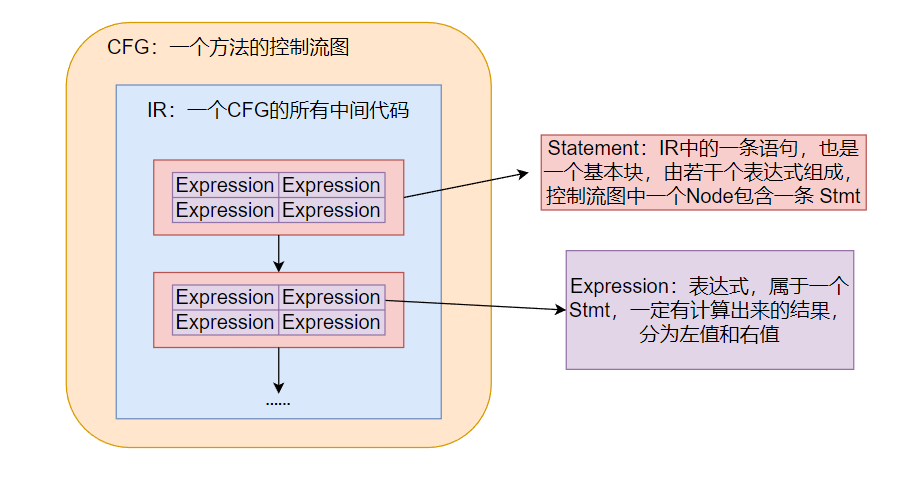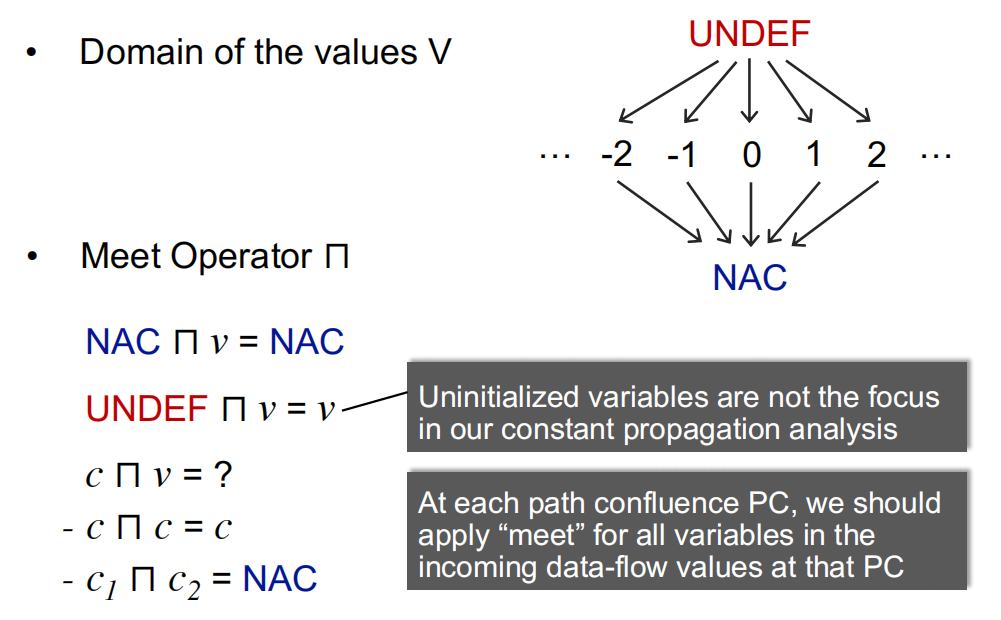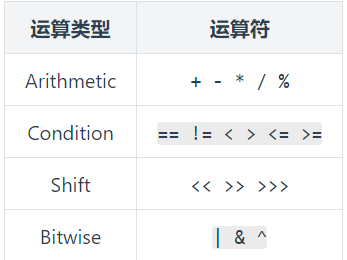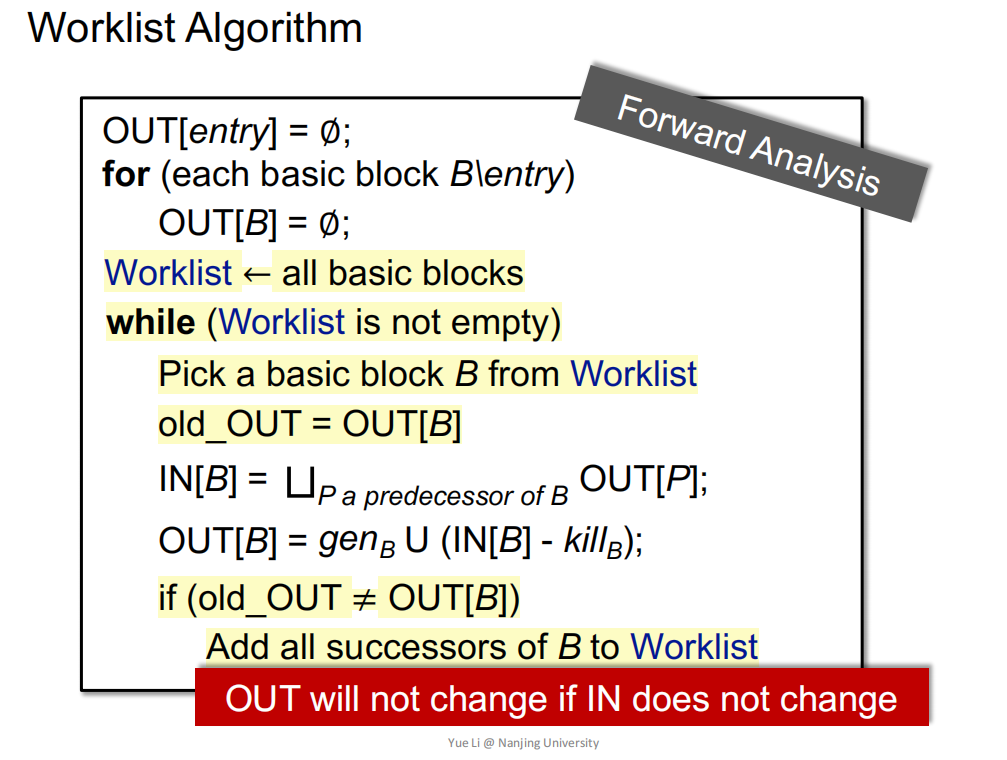【南大静态代码分析】作业 2:常量传播和 Worklist 求解器
作业 2:常量传播和 Worklist 求解器
题目链接:https://tai-e.pascal-lab.net/pa2.html
评测链接:https://oj.pascal-lab.net/problem
作业出品:南京大学《软件分析》课程,谭添、李樾
项目结构讲解
实验进行之前,要对项目中类和方法充分理解,找到每个类所对应的代码分析领域中的部分。
| 类 | 含义 |
|---|---|
CFG |
一个方法的控制流图。 |
IR |
一个非抽象方法的方法体的中间表示,其中包含方法签名的参数(parameters)、方法体中的变量(variables)和方法体中的所有中间表示语句(Stmts)。这里需要注意一点,一个方法体的中间表示由多个中间表示语句(Stmts)组成。 |
Stmt |
一条中间表示语句。 |
Exp |
表达式的中间表示。要注意,表达式不是语句。 |
CPFact |
建立变量 Var 到格上的值 Value 之间的映射,代表 Data Flow Fact (IN,OUT)。一个程序点(program point)对应一个 CPFact 。 |
DataflowResult |
包含控制流图中的所有 Data Flow Fact 。 |

实现常量传播
算法伪代码描述:

newBoundaryFact:负责创建和初始化虚拟结点的Data Flow Fact。但是注意要把方法参数初始化为NAC。

原因是为了 safe-approximation ,我们不知道通过形参传递过来的参数是否是常量,所以为了安全,假设所有参数都是 NAC ,当然这样会导致精度损失问题,后面通过过程间分析可以有效解决这个问题。
根据题目要求,不是所有类型的参数都考虑,只有能转换成 int 类型的参数才考虑,所以别忘了用 canHoldInt 过滤一下。
@Override
public CPFact newBoundaryFact(CFG<Stmt> cfg) {
// TODO - finish me
CPFact cpFact = new CPFact();
for (Var param : cfg.getIR().getParams()) {
if (canHoldInt(param)) { // 只考虑可转换int类型的参数
cpFact.update(param, Value.getNAC()); // 建立参数到格上值(NAC)的映射
}
}
return cpFact;
}
newInitialFact:负责创建和初始化控制流图中除了Entry和Exit之外的结点的Data Flow Fact。
控制流图中一个结点的 IN 和 OUT 分别对应一个 Data Flow Fact ,记录当前程序点时变量的状态。
直接创建一个空的 CPFact 即可,方法体内还没有开始扫描。
@Override
public CPFact newInitialFact() {
// TODO - finish me
return new CPFact();
}
meetInto:负责处理transfer function之前可能遇到多个OUT时的合并处理。
具体的合并操作通过调用 meetValue 来处理。
@Override
public void meetInto(CPFact fact, CPFact target) {
// TODO - finish me
for (Var var : fact.keySet()) {
Value v1 = fact.get(var);
Value v2 = target.get(var);
target.update(var, meetValue(v1, v2));
}
}
meetValue:负责对格上的值进行合并。

分三种情况实现即可。
/**
* Meets two Values.
*/
public Value meetValue(Value v1, Value v2) {
// TODO - finish me
if (v1.isNAC() || v2.isNAC()) {
return Value.getNAC();
} else if (v1.isUndef()) {
return v2;
} else if (v2.isUndef()) {
return v1;
} else if (v1.isConstant() && v2.isConstant()) {
if (v1.getConstant() == v2.getConstant()) {
return v1;
} else {
return Value.getNAC();
}
} else {
return Value.getNAC();
}
}
transferNode:负责实现控制流图中结点的transfer function。如果OUT改变,返回true;否则返回false。
stmt 表示结点中的一条中间表示,一个结点只有一个中间表示。
题目要求只需要对赋值语句处理,所以用 DefinitionStmt 类型过滤。
对于所有赋值语句,只考虑具有左值,并且左值是变量且类型可以转换成 int 的语句。这些语句的右值是一个表达式,可能是常量,也能是变量、二元表达式。这个右值表达式的值将通过 evaluate 函数计算。
对于其他类型的语句,不做处理,out 直接复制 in 即可,相当于经过一个恒等函数。
@Override
public boolean transferNode(Stmt stmt, CPFact in, CPFact out) {
// TODO - finish me
CPFact copy = in.copy(); // 复制in给copy,避免影响in。
if (stmt instanceof DefinitionStmt) { // 只处理赋值语句
if (stmt.getDef().isPresent()) { // 如果左值存在
LValue lValue = stmt.getDef().get(); // 获取左值
if ((lValue instanceof Var) && canHoldInt((Var) lValue)) { // 对于符合条件的左值
copy.update((Var) lValue, evaluate(((DefinitionStmt<?, ?>) stmt).getRValue(), copy)); // 计算右值表达式的值用来更新左值变量在格上的值
}
}
}
return out.copyFrom(copy); // copy复制给out。copy和in相比,有更新,返回true;反之返回false
}
evaluate:负责表达式值的计算。
表达式分三种情况讨论
- 常量:直接赋值。
- 变量:获取变量的值再赋值。
- 二元运算:针对共 12 中运算分别处理。

有几个易错点,容易卡评测:
NAC / 0 = Undef:这个点没有明确在题目中说明,但确实存在,需要单独处理。- 其他类型的表达式返回
NAF:不仅仅说上面三种类型之外的表达式,二元运算中有可能还有别的类型的运算,也需要返回NAF。
/**
* Evaluates the {@link Value} of given expression.
*
* @param exp the expression to be evaluated
* @param in IN fact of the statement
* @return the resulting {@link Value}
*/
public static Value evaluate(Exp exp, CPFact in) {
// TODO - finish me
if (exp instanceof Var) { // 变量
return in.get((Var) exp);
} else if (exp instanceof IntLiteral) { // 常量
return Value.makeConstant(((IntLiteral) exp).getValue());
} else if (exp instanceof BinaryExp) { // 二元运算
Value v1 = in.get(((BinaryExp) exp).getOperand1()); // 获取运算分量在格上的值
Value v2 = in.get(((BinaryExp) exp).getOperand2());
if (v1.isNAC() || v2.isNAC()) { // 易错点1:NAC / 0 = Undef
if (v1.isNAC() && v2.isConstant() && exp instanceof ArithmeticExp) {
ArithmeticExp.Op operator = ((ArithmeticExp) exp).getOperator();
if (operator == ArithmeticExp.Op.DIV || operator == ArithmeticExp.Op.REM) {
if (v2.getConstant() == 0) return Value.getUndef();
}
}
return Value.getNAC();
}
if (v1.isUndef() || v2.isUndef()) {
return Value.getUndef();
}
if (exp instanceof ArithmeticExp) {
ArithmeticExp.Op operator = ((ArithmeticExp) exp).getOperator();
switch (operator) {
case ADD -> {
return Value.makeConstant(v1.getConstant() + v2.getConstant());
}
case DIV -> {
if (v2.getConstant() == 0) return Value.getUndef();
return Value.makeConstant(v1.getConstant() / v2.getConstant());
}
case MUL -> {
return Value.makeConstant(v1.getConstant() * v2.getConstant());
}
case SUB -> {
return Value.makeConstant(v1.getConstant() - v2.getConstant());
}
case REM -> {
if (v2.getConstant() == 0) return Value.getUndef();
return Value.makeConstant(v1.getConstant() % v2.getConstant());
}
}
} else if (exp instanceof ConditionExp) {
ConditionExp.Op operator = ((ConditionExp) exp).getOperator();
switch (operator) {
case EQ -> {
if (v1.getConstant() == v2.getConstant()) return Value.makeConstant(1);
else return Value.makeConstant(0);
}
case GE -> {
if (v1.getConstant() >= v2.getConstant()) return Value.makeConstant(1);
else return Value.makeConstant(0);
}
case GT -> {
if (v1.getConstant() > v2.getConstant()) return Value.makeConstant(1);
else return Value.makeConstant(0);
}
case LE -> {
if (v1.getConstant() <= v2.getConstant()) return Value.makeConstant(1);
else return Value.makeConstant(0);
}
case LT -> {
if (v1.getConstant() < v2.getConstant()) return Value.makeConstant(1);
else return Value.makeConstant(0);
}
case NE -> {
if (v1.getConstant() != v2.getConstant()) return Value.makeConstant(1);
else return Value.makeConstant(0);
}
}
} else if (exp instanceof BitwiseExp) {
BitwiseExp.Op operator = ((BitwiseExp) exp).getOperator();
switch (operator) {
case OR -> {
return Value.makeConstant(v1.getConstant() | v2.getConstant());
}
case AND -> {
return Value.makeConstant(v1.getConstant() & v2.getConstant());
}
case XOR -> {
return Value.makeConstant(v1.getConstant() ^ v2.getConstant());
}
}
} else if (exp instanceof ShiftExp) {
ShiftExp.Op operator = ((ShiftExp) exp).getOperator();
switch (operator) {
case SHL -> {
return Value.makeConstant(v1.getConstant() << v2.getConstant());
}
case SHR -> {
return Value.makeConstant(v1.getConstant() >> v2.getConstant());
}
case USHR -> {
return Value.makeConstant(v1.getConstant() >>> v2.getConstant());
}
}
}
else { // 易错点2:二元表达式中的其他类型表达式
return Value.getNAC();
}
}
return Value.getNAC();
}
实现 Worklist 求解器
算法伪代码描述:

initializeForward:初始化所有的Data Flow Fact。注意虚拟节点Entry的OUT别忘了
protected void initializeForward(CFG<Node> cfg, DataflowResult<Node, Fact> result) {
// TODO - finish me
result.setOutFact(cfg.getEntry(), analysis.newBoundaryFact(cfg));
for (Node node : cfg) {
if (cfg.isEntry(node)) continue;
result.setInFact(node, analysis.newInitialFact());
result.setOutFact(node, analysis.newInitialFact());
}
}
doSolveForward:负责实现 Worklist 求解器具体步骤。
@Override
protected void doSolveForward(CFG<Node> cfg, DataflowResult<Node, Fact> result) {
// TODO - finish me
ArrayDeque<Node> worklist = new ArrayDeque<>(); // 双端堆栈当队列用
for (Node node : cfg) { // 添加所有结点到队列中
if (cfg.isEntry(node)) {
continue;
}
worklist.addLast(node);
}
while (!worklist.isEmpty()) {
Node node = worklist.pollFirst(); // 弹出队头结点
for (Node pred : cfg.getPredsOf(node)) { // 对该结点以及所有前驱结点的OUT做meet
analysis.meetInto(result.getOutFact(pred), result.getInFact(node));
}
boolean f = analysis.transferNode(node, result.getInFact(node), result.getOutFact(node));
if (f) { // 如果该节点OUT发生了变化,将其所有后继节点添加到队列
for (Node succ : cfg.getSuccsOf(node)) {
worklist.addLast(succ);
}
}
}
评测结果

本文作者:GHR
本文链接:https://www.cnblogs.com/gonghr/p/17979609
版权声明:本作品采用知识共享署名-非商业性使用-禁止演绎 2.5 中国大陆许可协议进行许可。




【推荐】国内首个AI IDE,深度理解中文开发场景,立即下载体验Trae
【推荐】编程新体验,更懂你的AI,立即体验豆包MarsCode编程助手
【推荐】抖音旗下AI助手豆包,你的智能百科全书,全免费不限次数
【推荐】轻量又高性能的 SSH 工具 IShell:AI 加持,快人一步